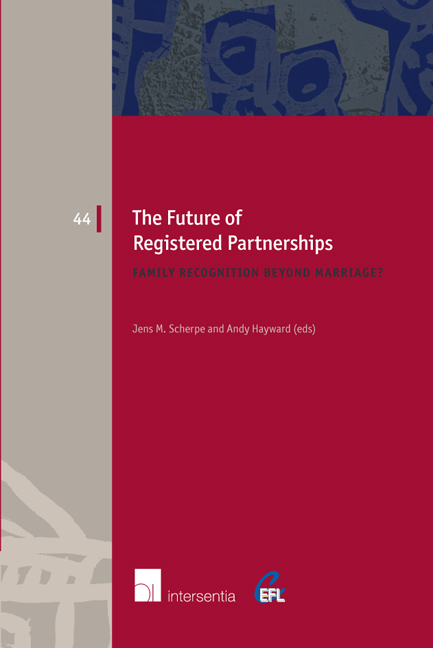Book contents
- Frontmatter
- Foreword
- Preface
- Contents
- List of Contributors
- The Future of Registered Partnerships: An Introduction
- Questionnaire
- Part I Registered Partnerships as a Functional Equivalent to Marriage
- Part II Registered Partnerships as an Alternative to Marriage
- Part III Registered Partnerships in a Time of Transition
- Registered Partnerships in England and Wales
- Registered Partnerships in Scotland
- Registered Partnerships in Northern Ireland
- Registered Partnerships in the Republic of Ireland
- Registered Partnerships in Greece and Cyprus
- Part IV Alternative Models for Registered Partnerships: Beyond Conjugality, Beyond Formality
- Part V Registered Partnerships, Discrimination and Human Rights
- Part VI Comparative Perspective and Conclusions
- Index
- European Family Law Series
Registered Partnerships in England and Wales
from Part III - Registered Partnerships in a Time of Transition
Published online by Cambridge University Press: 22 September 2018
- Frontmatter
- Foreword
- Preface
- Contents
- List of Contributors
- The Future of Registered Partnerships: An Introduction
- Questionnaire
- Part I Registered Partnerships as a Functional Equivalent to Marriage
- Part II Registered Partnerships as an Alternative to Marriage
- Part III Registered Partnerships in a Time of Transition
- Registered Partnerships in England and Wales
- Registered Partnerships in Scotland
- Registered Partnerships in Northern Ireland
- Registered Partnerships in the Republic of Ireland
- Registered Partnerships in Greece and Cyprus
- Part IV Alternative Models for Registered Partnerships: Beyond Conjugality, Beyond Formality
- Part V Registered Partnerships, Discrimination and Human Rights
- Part VI Comparative Perspective and Conclusions
- Index
- European Family Law Series
Summary
HISTORY AND BACKGROUND
BASIC STRUCTURES OF THE LAW ON ADULT RELATIONSHIPS
Two formalised relationship statuses exist in England and Wales: marriage and civil partnership. Marriage between opposite-sex couples has been celebrated in this jurisdiction for centuries. Whilst originally regulated exclusively through ecclesiastical law, following the Marriage Act 1836 civil marriages could be celebrated and after the Matrimonial Causes Act 1857 a secular, civil court determined all matrimonial issues. Much more recently, the Marriage (Same Sex Couples) Act 2013 opened up marriage to same-sex couples, offering the opportunity for civil marriages and, in some circumstances, religious marriages.
Operating alongside marriage, civil partnerships were introduced in December 2005 through the Civil Partnership Act 2004. Civil partnerships confer upon the parties virtually the same legal entitlements as marriage and, in light of few differences between them, have been regarded as ‘ marriage in all but name’. A significant difference, however, is that only same-sex couples can enter a civil partnership. When same-sex marriage was introduced in March 2014, the law on civil partnerships, rather surprisingly, remained as it was. As a result, England and Wales (alongside Scotland) now permits same-sex couples access to two relationship forms yet limits opposite-sex couples to one.
Cohabitation is the fastest growing relationship form in this jurisdiction. However, unlike other jurisdictions, England and Wales does not possess a statutory regime granting rights and remedies to cohabitants following relationship breakdown. Despite the production of multiple reform proposals, there is currently no comprehensive regime under which cohabitants can obtain remedies after satisfying eligibility criteria. Entitlements generated by cohabitation are recognised in some instances but are conferred in an ad hoc manner, drawing upon a wide range of statutory provisions.
MOTIVES FOR INTRODUCTION OF CIVIL PARTNERSHIPS
The motivation behind civil partnerships came from a variety of different sources. One driver was to offersome form of legal protection to individuals in same-sex relationships. In 1957 the Wolfenden Report led to the Sexual Offences Act 1967 which partially decriminalised homosexual acts in private between consenting adults (namely, those over the age of 21). This development precipitated gradual public visibility of same-sex relationships. However, the law did not keep pace with social change, as same-sex couples faced unequal treatment in the fields of pension rights, employment benefits, inheritance and hospital visitation rights.
- Type
- Chapter
- Information
- The Future of Registered PartnershipsFamily Recognition Beyond Marriage?, pp. 187 - 224Publisher: IntersentiaPrint publication year: 2017



